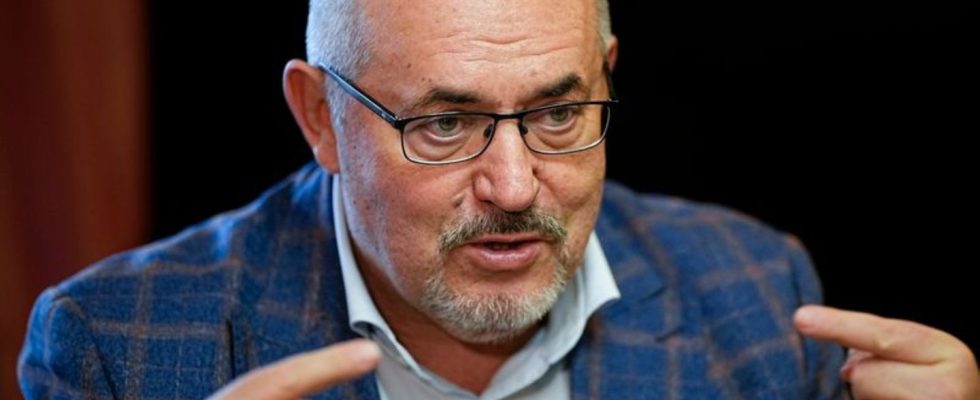It is considered impossible that Boris Nadezhdin could win the presidential election in Russia. But the war opponent’s application has met with unexpectedly high levels of support among many Russians.
It’s an uncomfortable January day in Moscow. The temperatures are around freezing point, snow keeps falling and the sidewalks are muddy. Nevertheless, a long queue of people has once again formed in front of the office of Boris Nadezhdin – an opposition war opponent who wants to challenge Kremlin leader Vladimir Putin in the presidential election on March 17th. But in order for Nadezhdin to be approved as a candidate, he needs at least 105,000 citizens’ signatures – and these Muscovites want to contribute to that.
Young and old people came, students and pensioners, men and women. The people at the front of the line say they waited in line for about an hour. The police have taken up positions on the other side of the street. “He is the only applicant who openly opposes the special military operation,” says 68-year-old Yuri about Nadezhdin. “In my opinion, a candidate with anti-war policies is what we need,” says 20-year-old Anna, who is a few steps behind Juri.
Putin is seeking a fifth term in office
From the Kremlin’s point of view, the presidential election, which is overshadowed by allegations of fraud and manipulation, actually serves one purpose: it is intended to secure the 71-year-old Putin’s fifth term in office and at the same time demonstrate how much the people supposedly still support the war against Ukraine even after around two years . Instead, the candidate who is the only one who categorically rejects this invasion is now making headlines – and is therefore receiving unexpectedly great support in Russia.
The 60-year-old Nadezhdin, who was born in Tashkent in what is now Uzbekistan during the Soviet era, is anything but a newcomer to Russian politics. He sat in the State Duma for the liberal bloc “Union of Right-Wing Forces” from 1999 to 2003, later changing parties several times. He has contacts in the presidential administration and appeared on state television political talk shows for years – to the annoyance of other opposition figures. Nadezhdin was previously considered a pragmatist who sometimes cooperated with those in power when it seemed useful to him for his own goals.
Criticism of the war
But now the liberal has set out on a confrontation course with the Kremlin. He formulates it carefully when it comes to criticism of the war – after all, it has already landed many other opposition members in prison camps in recent months. So Nadezhdin repeatedly speaks of “all of this” when he means the war, and of “there” when it comes to Ukraine.
But his message is clear: “The country wants all of this to stop. The people want those who are there to return,” he said recently during a campaign appearance where he appeared alongside women who want their mobilized men back from the front.
The fact that opposition leaders such as exiled Mikhail Khodorkovsky and imprisoned Putin opponent Alexei Navalny are now calling for Nadezhdin’s support is giving him a boost. And Kremlin critic Yekaterina Duntsova, who actually wanted to become a presidential candidate herself, also took Nadezhdin’s side after Russia’s election commission kicked her out of the race early at the end of December.
More signatures than necessary
With all this support, Nadezhdin finally reached a milestone: at the end of last week, his team announced that around 200,000 citizens’ signatures had been collected across the country – far more than were necessary for him to register as a candidate. However, it is still extremely questionable whether Nadezhdin will actually appear on the ballot in the end.
“I don’t think that’s very realistic, because they want to completely control the elections,” says journalist and political analyst Andrei Pertsev in an interview with the German Press Agency about the Kremlin’s interests. “But Nadezhdin is rallying the protest electorate behind him.”
It is possible that the Kremlin was initially sympathetic to Nadezhdin’s application – and saw him as a welcome pseudo-rival who suggests a choice where in reality there is none. But Nadezhdin has long since become uncomfortable with his open criticism of the war, says Pertsev, who lives in exile and works for the independent Russian portal Meduza and the think tank Carnegie Endowment for International Peace.
Kremlin spokesman Dmitry Peskov recently said when journalists asked him about Nadezhdin: “We don’t see him as a competitor.” But Pertsev is convinced that if Nadezhdin were actually approved as a candidate, it would be a “real risk” for the Kremlin given the war-weariness of many Russians.
In addition, the expert explains that now is a particularly good time to stop Nadezhdin from the perspective of the power apparatus: The requirements for approval as a candidate are complex and the formalities required for citizens’ signatures are high. It would therefore be easy for the election commission, which has to review the signatures by February 10th, to deny Nadezhdin candidate status under a pretext.
Sign of protest
Many of Nadezhdin’s supporters also know that a war opponent like him has little chance in Putin’s Russia, which is increasingly repressive against dissidents. Many therefore saw their signature primarily as an opportunity to finally express their dissatisfaction again, while anti-war protests have long been brutally suppressed.
A woman – Natalja, 34 years old – explicitly asks to be included in this article. There are many war supporters in Russia, but the world should see that there are also war opponents, she says. The many people in the queue encouraged her. Referring to Nadezhdin, she adds: “Even if he doesn’t win, I now know that I’m not alone. That there are many people who don’t support any of this (…) and who want the war to end as quickly as possible.”

